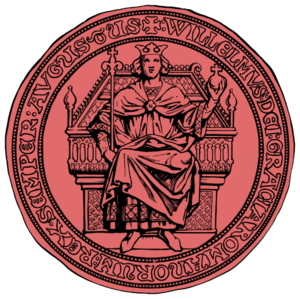William II of Holland facts for kids
Quick facts for kids William |
|
|---|---|

Effigy of William on his seal
|
|
| King of Germany (formally King of the Romans) |
|
| Reign | 3 October 1247 – 28 January 1256 |
| Coronation | 1 November 1248, Aachen |
| Predecessor | Conrad IV |
| Successor | Richard |
| Born | February 1227 |
| Died | 28 January 1256 (aged 28) |
| Spouse | Elisabeth of Brunswick-Lüneburg |
| Issue | Floris V, Count of Holland |
| House | Holland (Gerulfings) |
| Father | Floris IV, Count of Holland |
| Mother | Matilda of Brabant |
William II was an important ruler in the Middle Ages. He was the Count of Holland and Zeeland from 1234 until he died in 1256. He was also chosen as a king of Germany in 1248. From 1254, he ruled Germany alone.
Contents
Early Life of William II
William was born in February 1227. He was the oldest son of Floris IV, Count of Holland and Matilda of Brabant.
When William was only seven years old, his father died. This happened during a knight's tournament in a place called Corbie. William's uncles, William and Otto, who was a bishop, took care of him. They were his guardians until 1239.
Becoming King of Germany
William became king with help from his mother's brother, Duke Henry II of Brabant. The archbishop of Cologne, Konrad von Hochstaden, also supported him.
William was chosen as king of Germany in 1248. This happened after the Emperor Frederick II was removed from the church by the Pope. William took over from another king, Henry Raspe, who had died a year earlier.
Building The Hague
After becoming king, William decided to make his father's hunting lodge bigger. He wanted it to be a grand palace that fit his new royal status. This palace later became known as the Binnenhof (which means Inner Court). This was the very beginning of the city of The Hague.
His Coronation
William had to fight to be fully accepted as king. He laid siege to the city of Aachen for five months. This city was held by supporters of the old emperor. After capturing Aachen, he was finally crowned king by Archbishop Konrad of Cologne.
To gain more support, William married Elisabeth of Brunswick-Lüneburg in 1252. She was the daughter of Duke Otto the Child, Duke of Brunswick-Lüneburg. He was chosen as King of the Romans a second time in 1252. However, his power mostly stayed in the area around the Rhine River.
Wars and Policies
In his home region, William fought against Countess Margaret II of Flanders. They were fighting for control over Zeeland. As king of Germany, William claimed Zeeland as his own.
In 1253, William defeated the Flemish army in a battle at Westkapelle. A year later, the fighting stopped for a while. William's actions against Flanders made his relationship with France worse.
From 1254 until his death, William fought many wars against the West Frisians. He built strong castles in Heemskerk and Haarlem. He also created roads to help with the war against the Frisians.
Giving City Rights
William also gave special "city rights" to several towns. These towns included Haarlem, Delft, 's-Gravenzande, and Alkmaar. This meant these places gained more freedom and could govern themselves better.
In 1255, William made a rule about "Pfahlbürger." These were people who were citizens of a city but did not actually live there. William's rule stopped cities from having or accepting these types of citizens.
Family Life
William married Elisabeth of Brunswick-Lüneburg in 1252. They had one son together. Their son was named Floris V, and he was born in 1254.
Death of William II
William II died on January 28, 1256. He was fighting near a place called Hoogwoud. He was trying to cross a frozen lake by himself because he was lost. His horse fell through the ice, leaving him stuck and helpless.
In this difficult situation, William was killed by the Frisians. They secretly buried his body under the floor of a house. Twenty-six years later, his son Floris V found his body. Floris V then took terrible revenge on the West Frisians for his father's death. William was later buried in Middelburg.
People at the time saw William as a brave hero, like the legendary King Arthur. Today, you can find a golden statue of William at the Binnenhof in The Hague. This is the main government building complex in the Netherlands.
See also
 In Spanish: Guillermo de Holanda para niños
In Spanish: Guillermo de Holanda para niños
- Counts of Holland family tree
 | Misty Copeland |
 | Raven Wilkinson |
 | Debra Austin |
 | Aesha Ash |

